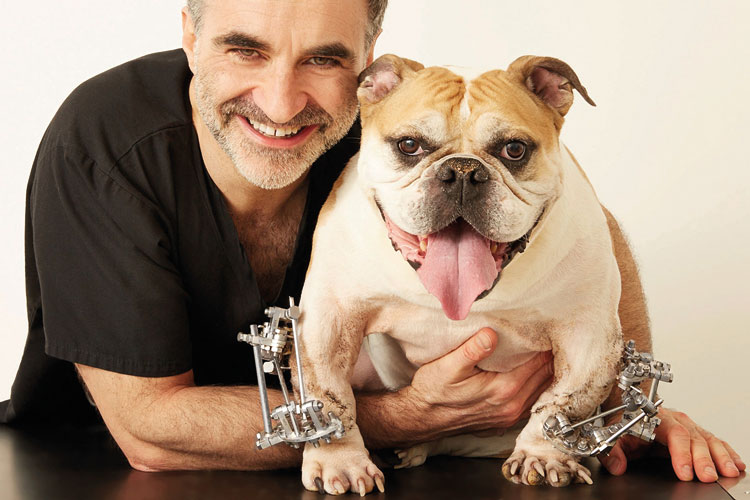He treated Meghan Markle’s dog and Russell Brand’s cat. But now the TV vet is dealing with serious injury and trauma – his own and his beloved terrier’s
On the way to his office Prof Noel Fitzpatrick gives me a quick tour of all the familiar locations from Channel 4’s The Supervet, flicking lights on and off as we go: the consulting room, the operating theatre, complete with viewing gallery. I have already visited the main entrance where, on the TV programme, a pair of receptionists ooh and ahh over new, frequently unprepossessing, animal arrivals.
Finally we end up in Fitzpatrick’s densely cluttered office, also familiar, where he sits at a desk dominated by five computer screens. Skeletons and bits of metal implants cover the flat surfaces, including the windowsill. Behind me is a standing cardboard cutout of the actor Hugh Jackman; on the wall next to my head is a sign that reads: “Always be yourself, unless you can be Batman. Then always be Batman.”
“Why would you not always be Batman?” Fitzpatrick explains.
The Supervet is now on its 15th series, its formula as durable as ever since its 2014 debut: cute animals, devoted carers, life-or-death medical intervention, groundbreaking bionic limbs, the occasional celebrity client: Take That’s Mark Owen, say, and his doberman Arnold’s ruptured cruciate ligament. Fitzpatrick doesn’t just push at the boundaries of what can be done to help animals, but also at what should be done, in terms both of intervention and cost. Most of us have a rough idea of what we’d spend to save the life of our cat, or at least we think we do. The Supervet extends our capacity for compassion, for free.
“I never felt the TV show is about looking after animals,” says Fitzpatrick. “I felt The Supervet is about looking after the world.”
In person, he has a silent-film-star complexion – pale skin, mascara-dark eyelashes, heavy, expressive eyebrows – and an affable, weary air, which I later think might just be weariness. He is by turns funny, disarmingly frank, and alarmingly intense.
He wants to know what I thought of his new book, How Animals Saved My Life: Being The Supervet, particularly the final pages, which were written less than a week ago, early on the morning of the day the book went to the printers.
“You’re the first person who’s read that,” he says. I tell him I thought it was a very powerful ending. I can’t think of anything else to say.
“I knew I was writing from a place of trauma,” he says. “But what choice did I have? Those were the cards that fate had dealt.”
Here’s what happened: on the evening of 18 September, a fortnight before our meeting, Fitzpatrick left his office with Keira, his 13-year-old border terrier and constant companion (he also has a cat called Ricochet). The pair were walking the 25 feet to Fitzpatrick’s car when a delivery van came round the corner, the driver evidently seeing neither of them. Fitzpatrick tried to pull Keira to safety, but it was too late.
He shows me the spot where it happened, just below his office window, leaning over the dog skeleton on the sill. “I’m halfway across that driveway, between that black thing and my car, and he comes a bazillion miles an hour from the left,” he says. “I’m two feet away from the front tyre, hearing her body explode. And I still can’t come to terms with it.”
Fortunately, Keira was at the back door of a world-class, 24-hour veterinary complex, as seen on TV. She was whisked into surgery within minutes. Once she was stabilised, Fitzpatrick performed a further operation in an attempt to save the dog’s shattered pelvis. While we’re talking, he rings Andy, the surgical resident, to check on her.
“I saw her last night at 2am, and she remains critical,” he tells me quietly, phone to his ear. “I did eight hours of surgery on her last Sunday, and she’s had another blood transfusion…” Andy picks up at the other end. “Hey, mate,” Fitzpatrick says. “How’s it going this morning?”
He and Andy have a long and technical conversation about Keira’s condition, about swapping one broad spectrum antibiotic for another, about her “packed cell volume” (better, but still low) and potassium levels (also low). Throughout he is measured and calm, but after the call he is visibly drained.
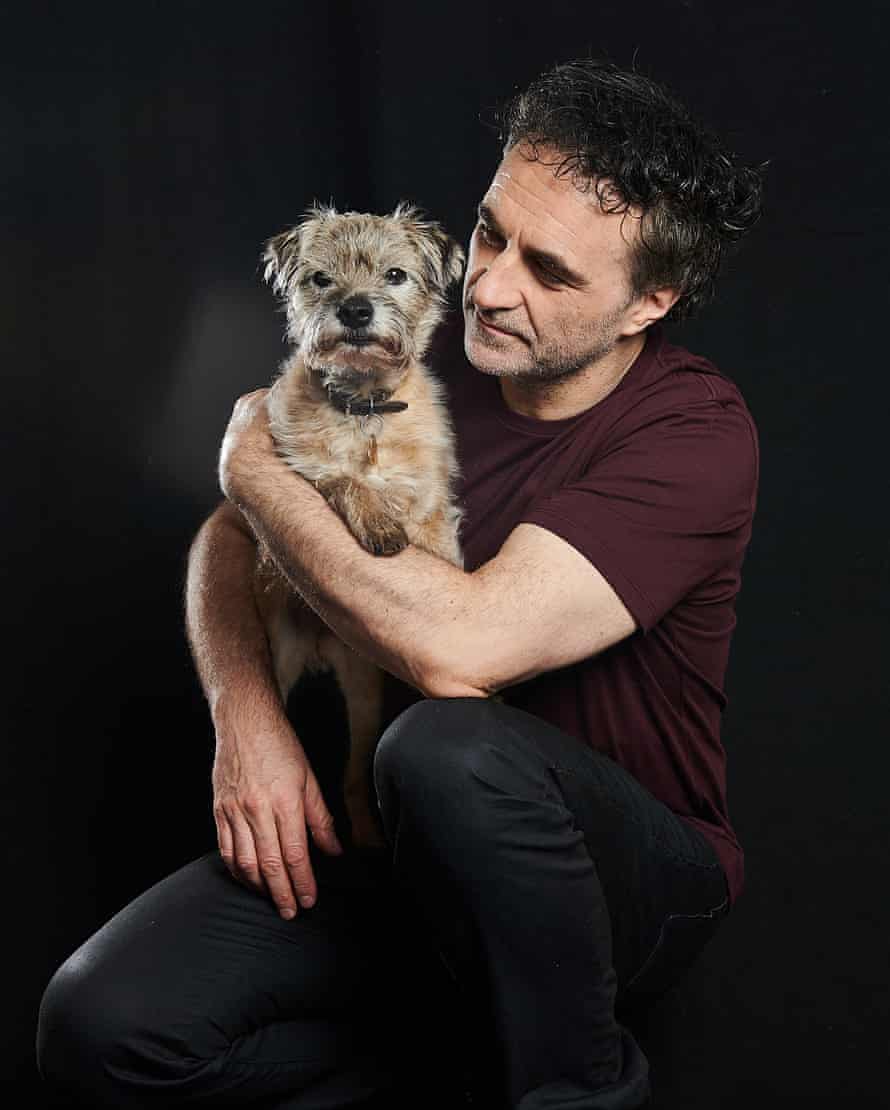
On the Monday morning after the surgery, Fitzpatrick had to face the problem of his about-to-be-printed, as-yet-uncompleted book. “I just put it out there to the universe and I said, ‘Keira, do I finish this book now?’” he tells me. “And I was just in fucking bits.” Tears fill his eyes as he speaks. His voice wobbles and cracks.
“I’m like, what do I do? Do I tell the story as it actually happened, and try and reflect that in the essence of the book? And I don’t know how it’s turned out, because I haven’t actually read it, but I think what’s happened is that the thought process came back to where it was in the beginning – where I lost my first patient, and I didn’t want to lose my last patient.” He’s referring to a newborn lamb he couldn’t save as a boy on his father’s farm, a formative experience that made him determined to become a vet. “But I was at a point – I should now be strong enough, I’ve spent 30 years getting strong enough, so I shouldn’t be that worthless boy any more.”
****
Fitzpatrick didn’t set out to write a memoir, largely because he already has. His book Listening To The Animals: Becoming The Supervet, a bestseller in 2018, covered his life from boyhood on the farm in County Laois, Ireland, to fame as The Supervet. In frank, funny and sometimes heartrending detail, he recounted being bullied as a local day boy at a Catholic boarding school, and the years he spent living largely in his head, conjuring up a superhero called Vetman, who came to embody not just Fitzpatrick’s dream but an entire moral framework, with attributes borrowed from an assembled pantheon of heroes including Batman, Spiderman, the Six Million Dollar Man and Wolverine (hence the cardboard Hugh Jackman).
That first book also covered his struggle to get himself into and through vet school, his days as a large-animal practitioner in rural Ireland and his eventual relocation to the south-east of England, including a parallel career as an actor, with roles in Casualty, The Bill and a low-budget film called The Devil’s Tattoo. He even played a vet on an episode of Heartbeat, although he almost didn’t get the part because the casting director didn’t think he looked like a vet.
Acting taught him, he says, “how to speak to that pigeon on my shoulder, which is the camera”, but that side of him was subsumed by building up his practice and pushing the boundaries of veterinary orthopaedics and neurosurgery. He was bent on turning himself into a real-life Vetman, fitting cats and dogs with bionic limbs.
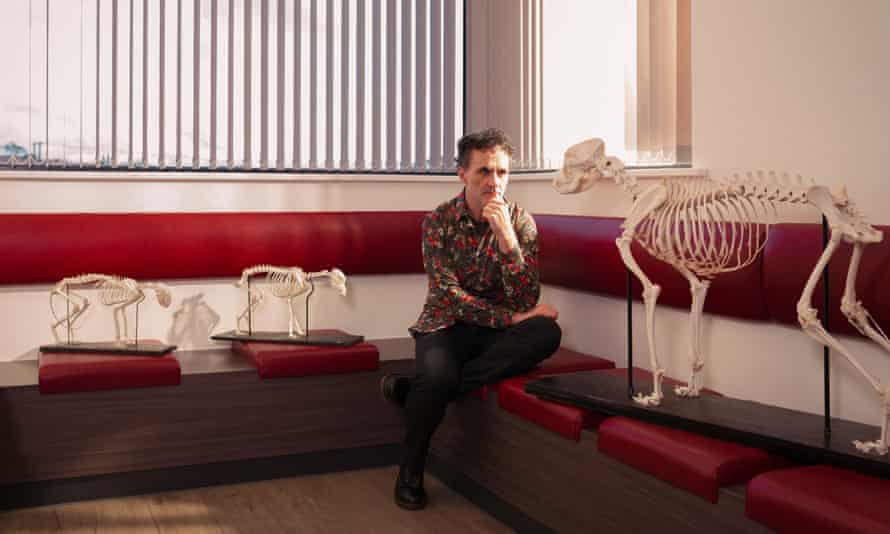
In 2003, Fitzpatrick treated DJ Chris Evans’s dog, Enzo, for a spinal problem, an encounter that eventually led to a BBC series called The Bionic Vet, a forerunner of The Supervet. Along the way, Fitzpatrick has helped a lot of celebrity pets, including Meghan Markle’s dog, Guy (Fitzpatrick was a guest at the royal wedding, but his shoes hurt so much he had to leave early), and Russell Brand’s cat, Morrissey, both of whom make appearances in the new book. But really, he says, he wanted to concentrate on the moral, ethical and philosophical lessons he’d learned over his 30-year career in veterinary medicine.
“I actually thought this book would be easier,” he explains, “because I set out with the idea in my head that I was going to go down the route of integrity and care. And I knew at the beginning that I was gonna have a structure for the book that was based around the two words that mattered most to me.” There is a rawness to the way he says these things, as if in defence of himself – as if the wounds those bullies inflicted in his schooldays never healed, or he never allowed them to.
The inspirational framework of the book remains intact, but unforeseen events would come to play a larger role in the story. It makes for a gripping read, even if his self-imposed structural constraints sometimes force Fitzpatrick to follow dramatic revelations with the words “of which more later”. No, you think. Tell me now!
In the end it wasn’t – and could never be – the book he set out to write at the start of 2020. Life saw to that.
“In my head I’m thinking, this is a parable of compassion for all of us,” he says. “A parable of compassion during coronavirus that we badly need. Of course corona hadn’t hit, and I hadn’t broken my neck, loads of other stuff hadn’t happened.”
Of which more later.
The book opens at the tail end of 2018, with Fitzpatrick about to take the stage for the last night of his Supervet Live arena tour, at the O2 in London. His first book, partially written in hotel rooms while he rehearsed the live show, had just hit the shelves. And Fitzpatrick, exhausted by his schedule, had lost his voice. In the end, a shot of steroids got him through the gig – a multimedia extravaganza that was part inspirational biography, part motivational lecture, part virtual operating theatre. As usual, Keira joined him on stage for a standing ovation. The next morning, he was back at work at his practice, getting ready to put down a labrador called Monty, when he was handed a white envelope from the Royal College of Veterinary Surgeons (RCVS). Inside were four depositions from fellow vets accusing him of malpractice and requesting a full disciplinary hearing. That’s a hard way to start a book about integrity and caring.
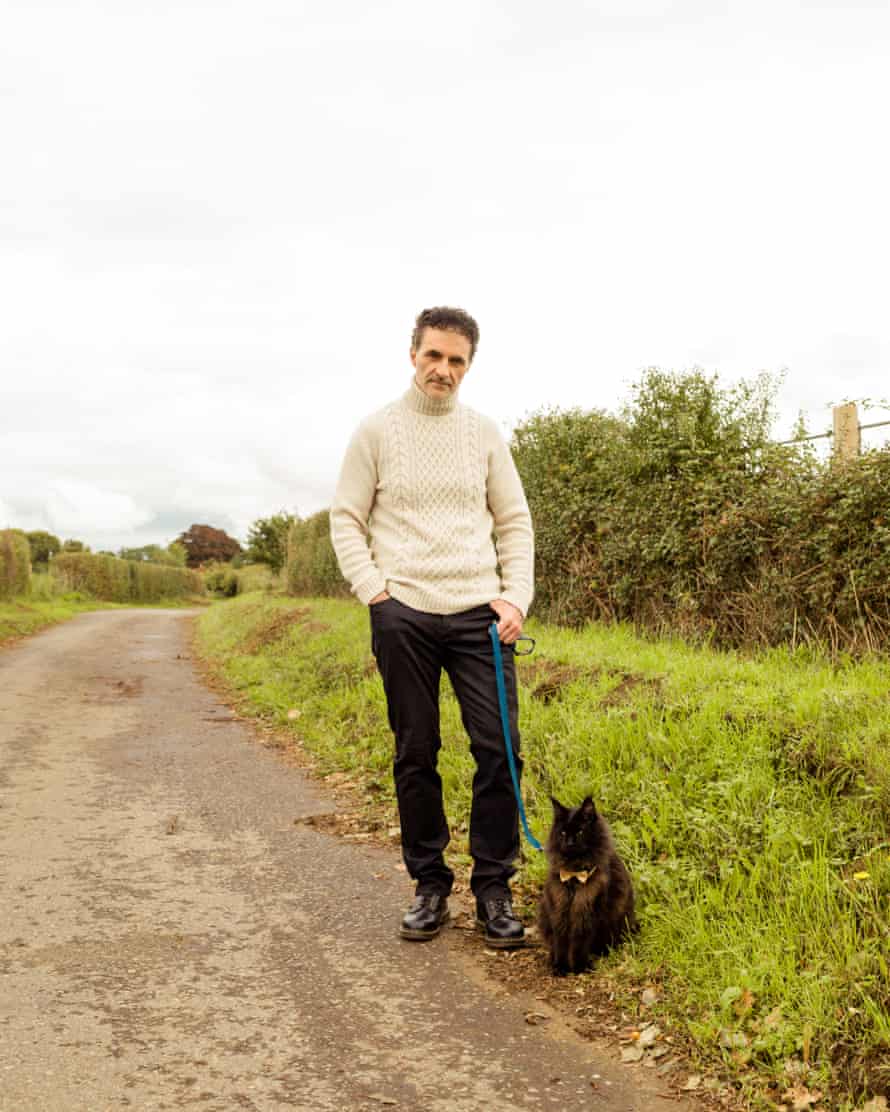
“I tried to be as honest as I could,” Fitzpatrick says. “Because a lot of people gloss it over, you know? Have I made mistakes? Fuck, yeah! Do I think I would do some things differently? Yeah. Do I think that any surgeon can walk into theatre and think that they’re God? No.”
Fitzpatrick stood accused of gross professional misconduct and bringing his profession into disrepute. The case in question, from 2017, involved multiple amputation and prosthesis surgery, which the complainants alleged amounted to overtreatment bordering on experimentation. They raised questions about the best interests of the patient and the manner in which the risks of surgery were presented to the patient’s legal guardian.
The patient in this case was a five-year-old tortoise called Hermes. You might remember Hermes: his story formed part of episode 4 of series 12 of The Supervet; three of his legs had been chewed off by rats, but he retained a certain lust for life. Fitzpatrick’s novel bone-implant prostheses had never been tried on the species before – he’d fitted wheels on tortoises, but never legs. Although the bone implants were a success, Hermes died of heart failure two months later. (It’s hard to read these sections of the book without the words “but it’s a tortoise” occasionally springing to mind, and I say that as a tortoise owner.)
Needless to say, Fitzpatrick objected to his integrity being impugned, not least, he says, because the best interests of his patients are at the heart of his philosophy of care, and his mission to grant animals greater ethical status than they currently enjoy.
“The hard thing was that I genuinely believed, and still do, that I was trying to help my patient, as did my entire clinical team,” he says. “The vet who was the primary care clinician, her practice is exclusively exotics, meaning that she knows lots about tortoises. The exotic specialist consultant who I worked with just works with exotic animals that are not dogs and cats. And the mum of Hermes was a human palliative care nurse, who was very sensible, very rational, knew the line in the sand of euthanasia.” Harder still, he says, was that the complaints came from vets who knew nothing of the case other than what they’d seen on television. “I do understand that if people feel strongly about something they pick somebody in the public eye – I get that,” he says. “But when you’re 22 and you take your oath to do no harm and look after the welfare of animals, we all take the same oath. All of us.”
The problem with that line in the sand is that it shifts with every medical advance. Risks diminish and outcomes improve. Talking about Keira, Fitzpatrick says: “If she presented to my practice in Ireland in 1990 she would now be dead. No question. No question, because it would have been physically impossible to deliver the level of care she’s had. So my question is: what constitutes overtreatment for Keira in the next 10 years?”
After 14 months, the RCVS decided, in a complicated adjudication, that Fitzpatrick’s actions did not amount to serious professional misconduct and closed the case. So why did he choose to share the episode with readers?
“I believe that if I didn’t share what had happened, then veterinary medicine and human medicine carry on as we are,” he says. “And then what’s the point in me making Supervet?”
In addition to his rigorous surgical schedule and the demands of the TV series, Fitzpatrick has written dozens of research papers, is a professor of orthopaedics at the Veterinary School at the University of Surrey and an associate professor at the University Of Florida School Of Veterinary Medicine (the full list of letters after his name runs like this: MVB DSc(Hon) DUniv CertSAO CertVR DipACVSMR DipECVSMR DSAS(Orth) MRCVS). He also presents a podcast called Animal People, in which celebrities discuss their relationships with their pets.
In 2014, he founded the Humanimal Trust to champion the concept of One Medicine, a convergence of human and animal healthcare that encourages cross-pollination of medical research, and aims to reduce animal experimentation in favour of clinical trials using companion animals (pets) who actually need treatment. The trust only funds projects that don’t take animal life.
“Everybody agrees that it would be a good idea to reduce, refine and replace the role of experimental animals in the development of drugs and implants,” he says. “That isn’t my idea. That’s a globally accepted idea. My central life purpose is to make us realise that it’s foolish to ignore the lessons of nature, while we induce disease in otherwise normal animals that we could get answers for if we had a more joined-up approach.”
Throughout his career, Fitzpatrick has tackled his own stress and anxiety with the soothing balm of overwork. In the process he has given himself some of the very same spinal issues he sees in the animals he treats. His personal life has suffered over the years and, at 52, he has never been married. (He does have a girlfriend, but he also still sleeps in the little bedroom next to his office several nights a week.) He has tried several relaxation techniques over the years, including Transcendental Meditation on the recommendation of Russell Brand; but he has never experimented with the idea of working less hard.
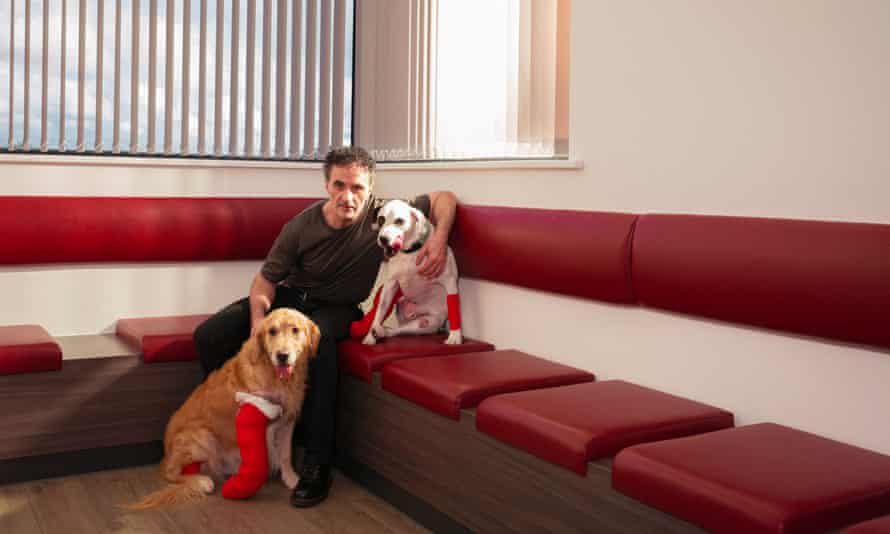
patients. Photograph: Dean Belcher/The Guardian
Then, in February, he broke his neck. By that point, the stress of the RCVS complaint investigation was taking its toll. He was, by his own admission, depressed, crying behind closed doors and sleeping badly, but he stuck to his same punishing schedule. One night he got up to pee, not fully awake, and fell down a flight of stairs. He heard his neck snap as he hit the wall at the bottom. He had, it transpired, fractured his C7 vertebra, at the base of the neck. In the end he managed to avoid surgery, but was immobilised in a neck brace, unable to work. It seemed like an unavoidable stocktaking.
“I believe that my overpowering sense of willpower to push things forward was temporarily affected, so that I connected with something deeper,” he says. “And in that sense it was a profound wake-up call. Also in the physical sense, that I was millimetres away from death. Had the vertebra shifted more, apparently, the fatality rate from an asleep fall down 13 steps into a wall is not good.”
One does not get the impression that the broken neck has led to serious consideration of slowing down. Fitzpatrick was back at work by mid-April. If anything his accident – not to mention Keira’s – has given him an urgent sense of time running short.
“I’ll tell you what,” he says. “I have to rationalise how I’m gonna pass on what’s important to the next generation before I’m too old and incapacitated to do it. I’m trying hard to create a mechanism by which that’s possible.” This, I think, is his way of saying he needs to delegate more.
He also has plans for a new project, he says, which he hopes might lead to a reconvergence of his artistic and scientific selves.
“My next adventure is Vetman,” he says. “I’m writing it now.” He is not ready to elaborate on what form Vetman will take. It sounds like an idea for a cartoon, but when he talks about Vetman he often sounds as if he’s talking about a real person. “I love him,” he says. “He is a beautiful man. He has the wings of a red admiral butterfly that carry the stardust of love between the heavens and the Earth.” He smiles. I nod, very slowly.
Vetman may well be the secret behind Fitzpatrick’s tireless drive. “I dream big, but I deliver in the reality of every day,” he says. But he also speaks sincerely about “being the advocate for sentience and the animal world, because by being the guardian angel for that, you become de facto an ambassador for the best that humanity can be.”
Be yourself, unless you can be Vetman. Why would you not always be Vetman?
